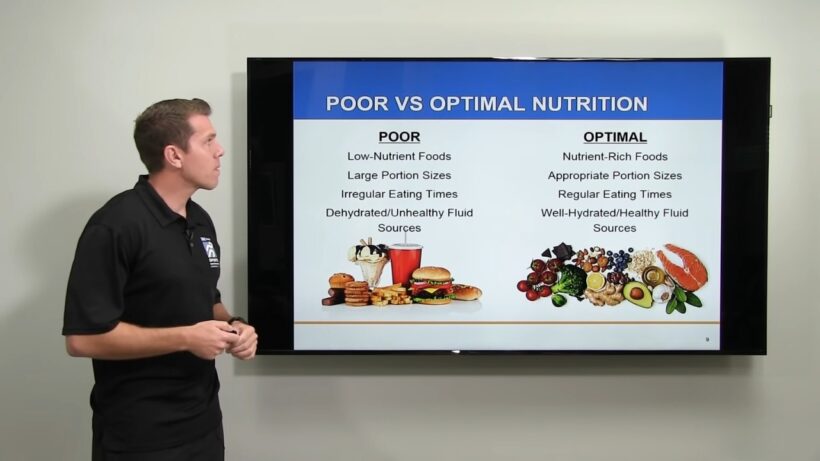Leading a good and healthy life is the way to happiness and a fulfilled life. Some people are able to get into this lifestyle faster than others, and if you have noticed that this is your calling, then you should pursue it.
Becoming a sports nutrition advocate is one of the easiest ways to ensure that you are on the right track, and at the same time, that you are putting all your effort into helping others get into a better shape and choose their diet right.
Here, we are going to tell you how this is the path to a healthier life and how to achieve your dreams of helping others become the best version of themselves.
Page Contents
- 1 It Is More than Just a Career Choice
- 2 Why Do You Need to Get Certified?
- 3 Understand the Science Behind the Skill
- 4 You Need to Know that Everyone Has Specific Needs and You Need to Figure Them Out
- 5 How to Successfully Combine Nutrition and Exercise?
- 6 This Career Is More than One-On-One Sessions
- 7 Create and Nurture Relationships if You Want to Succeed
- 8 Remember that You Are Focusing on Long-Term Goals
- 9 You Have to Have a Positive Relationship with Food
- 10 In Conclusion
It Is More than Just a Career Choice

Embarking on the path to becoming a sports nutrition advocate is more than just a career choice; it’s a commitment to helping individuals achieve their health and fitness goals.
Sports nutrition advocates are the guiding lights in the complex world of dietary choices, ensuring athletes and fitness enthusiasts alike receive the proper nutrients to enhance their performance and overall well-being.
This journey requires a deep understanding of nutrition science, exercise physiology, and the ability to effectively communicate these principles to diverse audiences. Sports nutrition advocates are essential partners in the pursuit of healthier living.
Why Do You Need to Get Certified?

In the realm of sports nutrition advocacy, knowledge is power. As you can see if you check this, obtaining a certification in sports nutrition equips advocates with the expertise needed to provide sound advice and evidence-based recommendations.
While there are various certification programs available, aspiring advocates should seek reputable avenues that offer comprehensive education on topics such as macronutrients, micronutrients, hydration, and supplementation.
A certification not only enhances credibility but also instills confidence in clients, assuring them that they are receiving guidance from a qualified professional committed to their well-being.
Understand the Science Behind the Skill

A pivotal aspect of sports nutrition advocacy lies in bridging the gap between scientific knowledge and practical application. Advocates serve as translators, distilling complex nutritional concepts into digestible information for their clients. By demystifying the science behind macronutrients, micronutrients, and dietary supplements, advocates empower individuals to make informed choices.
Education becomes a powerful tool, allowing clients to understand not just what to eat but why they are making specific dietary decisions. This knowledge empowers clients, fostering a sense of ownership over their nutritional choices and enabling them to navigate the ever-changing landscape of nutrition with confidence.
You Need to Know that Everyone Has Specific Needs and You Need to Figure Them Out
One of the fundamental roles of a sports nutrition advocate is tailoring nutrition plans to meet the unique requirements of each individual. Every person’s body responds differently to dietary interventions, making personalized nutrition guidance essential.
Advocates assess factors such as body composition, activity levels, specific fitness goals, and any dietary restrictions to create tailored plans. This personalized approach ensures that individuals receive the optimal balance of nutrients to fuel their bodies, enhance performance, and support recovery.
How to Successfully Combine Nutrition and Exercise?
Sports nutrition advocacy delves deep into the intricate relationship between nutrition and exercise. Advocates educate their clients on the significance of pre-and post-workout nutrition, emphasizing the importance of timing, quality, and quantity of food intake.
Whether an individual is an endurance athlete, weightlifter, or participates in team sports, understanding how nutrition fuels different types of exercises is paramount. Advocates guide clients on maximizing energy levels, minimizing muscle fatigue, and optimizing recovery through strategic dietary choices.
This Career Is More than One-On-One Sessions
Sports nutrition advocacy extends beyond one-on-one consultations. Advocates have the opportunity to make a broader impact by engaging in community outreach, educational initiatives, and public awareness campaigns. By sharing their knowledge through workshops, seminars, and online platforms, advocates contribute to a society well-informed about nutrition.
Additionally, they play a vital role in dispelling misinformation and promoting evidence-based practices. By actively participating in advocacy efforts, sports nutrition advocates become catalysts for change, influencing not only individuals but also communities, and fostering a culture of health and well-being.
Create and Nurture Relationships if You Want to Succeed

Successful sports nutrition advocates understand the significance of building lasting relationships with their clients. Beyond crafting meal plans and offering nutritional advice, advocates serve as motivators, cheerleaders, and sources of encouragement.
By developing a deep understanding of their client’s goals, challenges, and preferences, advocates tailor their guidance to align with the individual’s lifestyle. Establishing trust and rapport creates a conducive environment for open communication, allowing clients to share their concerns, victories, and setbacks.
This personalized approach fosters a sense of camaraderie and mutual respect, strengthening the bond between the advocate and their clients.
Remember that You Are Focusing on Long-Term Goals
Beyond immediate goals, sports nutrition advocates champion the cause of sustainable and holistic nutrition practices. This involves not only addressing short-term fitness objectives but also promoting long-term health and wellness. Advocates emphasize the importance of a balanced diet, encouraging the consumption of whole foods, lean proteins, fruits, vegetables, and whole grains.
Additionally, they educate clients about mindful eating, hydration, and the psychological aspects of nutrition. By fostering a comprehensive understanding of nutrition’s role in overall well-being, sports nutrition advocates empower individuals to make informed choices that lead to healthier and more fulfilling lives.
You Have to Have a Positive Relationship with Food

Beyond the technicalities of nutrient intake, sports nutrition advocates play a crucial role in helping clients foster a positive relationship with food. This involves dispelling myths, debunking fad diets, and promoting a balanced approach to eating.
Advocates encourage clients to view food not as an enemy but as a source of nourishment, energy, and enjoyment. By steering individuals away from restrictive diets and promoting mindful eating, advocates contribute to the development of healthier attitudes toward food.
This transformation goes beyond physical health, influencing mental and emotional well-being, promoting body positivity, and nurturing a healthy self-image.
In Conclusion
Becoming a sports nutrition advocate is a rewarding journey that blends passion for nutrition with the desire to make a positive impact on others’ lives. By obtaining the necessary knowledge, embracing personalized approaches, and promoting sustainable nutrition practices, advocates play a vital role in guiding individuals toward healthier living.
In this ever-evolving field, continuous learning, empathy, and a dedication to supporting others are the cornerstones of effective sports nutrition advocacy. As advocates continue to inspire and educate, they contribute significantly to building a healthier and more vibrant community.















